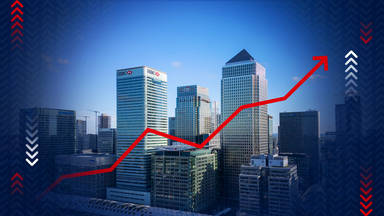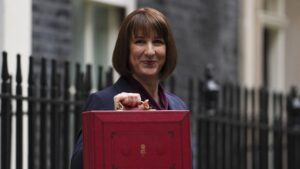UK economy grows 0.6% – as general election and strikes partially blamed for flatline in June
Across the first six months of 2024, the UK had the best growth of all G7 nations.

The UK economy grew 0.6% over three months, official figures show.
But there was no growth at all in June, the Office for National Statistics said, as businesses delayed purchases until after the general election.
“In a range of industries across the economy, businesses stated that customers were delaying placing orders until the outcome of the election was known,” the ONS said, however, it added that it is difficult to quantify the exact impact.
Money blog: Aldi axes click and collect
Strikes were also identified as a reason for the flatline – with junior doctors striking at the time.
The impact of international industrial disputes was also seen as last year’s US Screen Actors Guild strike is still affecting UK production schedules, the ONS said.
The June gross domestic product (GDP) number fell from a month earlier when the economy expanded 0.4%.
GDP – the measure of everything produced in the UK – expanded from April to June.
How does the UK compare?
That growth rate was the second highest among the G7 group of industrialised nations, with only the United States performing better at 0.7%.
Two G7 countries, however, have yet to publish their GDP data for the period – Japan and Germany.

Keep up with all the latest news from the UK and around the world by following Sky News
When looking at the first six months of the year, the UK has the highest growth rate with 0.7% GDP growth in the first three months of the year.
This is thanks to production in scientific research, the IT industry and legal services, the ONS said.
A second three-month period of growth means a recession is firmly in the rearview mirror.
The UK met the definition of recession when the economy shrank for two three-month quarters in a row at the end of 2023.
Why does it matter?
The Labour government has pinned its success on getting the economy growing.
Without growth it cannot make requisite public sector investments as it does not want to increase borrowing and instead bring down national debt, it has said.
The data is good news – but has not been warmly welcomed.
Make no bones about it – it has been a good week on the economic news front, writes Darren McCaffrey.
Today’s stellar GDP growth figures at 0.6% are in line with expectations but always a reflection of a strong year of growth, with the UK economy growing the fastest in the G7 this year – although lagging slightly behind the US in the last quarter.
This coupled with falling unemployment, wage growth and pretty stable inflation – the macro-economic situation has not longed this good in years.
Normally the government would be crowing from the rooftops about such good news but instead the Treasury this morning continuing to talk about the “scale of challenges” and that they determined “to fix the foundations”.
Why? Because they don’t want the Conservatives (who are unsurprisingly very frustrated) to be able to claim that they didn’t leave the country in a terrible state.
Politically this is important for Labour – part of a wider strategy to thrash the Tories’ record while cementing future credit for economic good news.
Though despite the attempt to shape narratives, in the end voters will only really thank Labour if this stellar economic growth continues.
“The new government is under no illusion as to the scale of the challenge we have inherited after more than a decade of low economic growth and a £22bn black hole in the public finances,” said Chancellor Rachel Reeves.
“That is why we have made economic growth our national mission and we are taking the tough decisions now to fix the foundations, so we can rebuild Britain and make every part of the country better off.”
Be the first to get Breaking News
Install the Sky News app for free


Former chancellor and now shadow chancellor Jeremy Hunt challenged that assessment.
“Today’s figures are yet further proof that Labour has inherited a growing and resilient economy,” he said.
“The chancellor’s attempt to blame her economic inheritance on her decision to raise taxes – tax rises she had always planned – will not wash with the public.”


